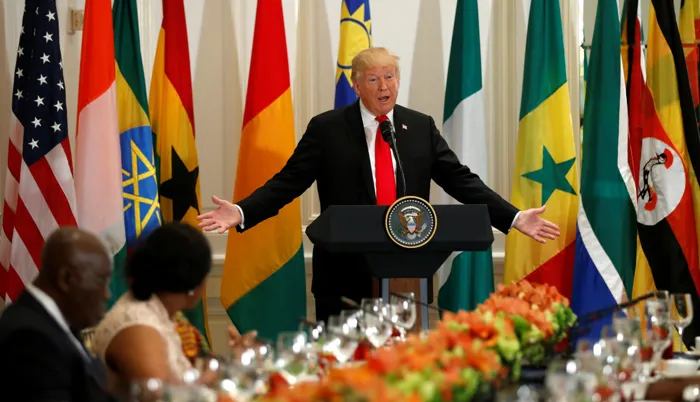Reports
Trump and Africa: Renewed Influence or Further Decline

By Sabah Moussa, Cairo
Africa is awaiting a potential shift in U.S. foreign policy following Trump’s re-election. Observing his first term, one might predict the shape of U.S.-Africa relations in the near future. Will Trump alter the global competition over Africa in favor of the United States?
Significant Fractures
Trump’s victory comes amid significant rifts in U.S.-Africa relations, leading to diminished influence and even complete U.S. withdrawal from parts of West Africa. This has driven African nations to lean towards traditional competitors like Russia and China. How does Africa view Trump’s return, and what are its expectations? Can Trump address the failures of the Biden administration, or will he continue the limited focus on Africa that characterized his previous term?
Bad News
Dr. Hamdi Abdel Rahman, an Egyptian expert in African affairs, believes Trump’s victory might spell bad news for Africa, with significant repercussions across various sectors. He notes that Trump’s “America First” motto could bring mixed effects on African economies. His administration might favor bilateral trade deals over multilateral agreements, benefiting resource-rich African countries but potentially harming smaller economies. Abdel Rahman further notes that the future of the African Growth and Opportunity Act (AGOA) is uncertain under Trump, especially as he has previously hinted at not renewing it beyond 2025—a move that could seriously impact key beneficiaries like South Africa.
Intensifying Competition
Trump’s hardline stance on immigration is likely to affect African migrants, particularly with his proposed deportation of one million undocumented individuals, a measure that may impact the growing number of African migrants at the U.S.-Mexico border. In terms of security, Trump may prioritize counter-terrorism activities through AFRICOM, possibly increasing military engagement in terror-prone areas such as the Sahel and the Horn of Africa. Trump’s return could heighten U.S.-China rivalry in Africa, potentially pressuring African nations to choose strategic allies, creating polarization on the continent. Meanwhile, Trump’s climate change skepticism might align with some African leaders’ economic goals, such as expanding fossil fuel extraction, though this could counter global efforts to curb climate change.
A New Opportunity
Dr. Rami Zahdi, Deputy Head of the Arab Center for African Studies, points out that U.S. foreign policy generally sees limited shifts regardless of the president. Still, he adds, Trump’s approach and implementation differ significantly from other presidents. Zahdi notes that while African leaders may welcome Trump as an opportunity to reshape U.S.-Africa relations, the fundamental question is whether Trump would commit to substantial change. In his previous term, Africa was not a priority on his agenda. This new term could be a chance for Africa to strengthen economic and strategic ties with the U.S., although the extent of Trump’s dedication remains uncertain.
Strategic Partnerships
According to Zahdi, the current administration has shown a basic level of diplomacy toward Africa but lacks tangible results. For instance, while Biden pledged to visit Africa, he has yet to fulfill this commitment. Despite U.S. interest in certain African affairs, major areas like digital transformation, infrastructure partnerships, and conflict resolution have seen little advancement under the current U.S. approach. Some African leaders may view Trump’s re-election as an opportunity to reset relations with the U.S. away from symbolic diplomacy and towards direct economic support and private sector development. Trump’s experience could lead to a more refined approach this term, focusing on sustainable, strategic partnerships that align with Africa’s developmental aspirations.
Significant Decline
Dr. Mohamed Torshin, a Sudanese scholar on African affairs, suggests there will be little change in U.S. policy towards Africa. He notes that Biden has exerted considerable effort, and Trump represents a faction within the Republican party favoring isolationism and prioritizing domestic issues. Torshin believes that under Trump, the U.S. will further retreat from Africa, which may strengthen other global players’ influence. This could result in greater stability across the continent, as the absence of American involvement might reduce international tensions.
Returning Influence
Conversely, Mauritanian journalist Abdullah Ambaty, an expert on the African Sahel, highlights the region’s core issues, such as security in the Sahel, instability in Sudan and Libya, and Russian involvement. He asserts that the Biden administration has poorly managed Africa, conceding influence to Russia without compensation. With Trump, Ambaty anticipates a more aggressive approach, possibly leading to a return of U.S. military bases to Niger, intensified engagement in Libya, or efforts to resolve the conflict in Sudan, signaling a potential resurgence of Western dominance in Africa.



